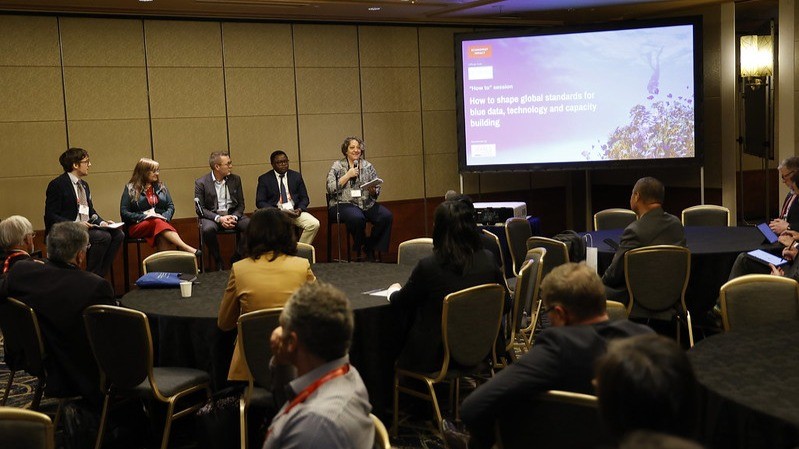During Economist Impact’s 12th annual World Ocean Summit & Expo in Tokyo I moderated a session on “How to shape global standards for blue data, technology and capacity building” with speakers Vicki Ferrini from Seabed 2030, Amon Kimeli from Kenya Marine and Fisheries Research Institute (KMFRI), Borre Pedersen from KSAT Kongsberg Satellite Services, and Jyotika Virmani from Schmidt Ocean Institute. The session discussed how multi-directional data and capacity-sharing can create collective benefit. We also heard how thinking global and acting local is critical, exemplified by Seabed 2030 and the WIObathy project in the Western Indian Ocean Region. Boosting ocean data literacy and data partnerships, for example via the Ocean Decade Alliance, is crucial. The entire suite of ocean data collection can be more efficient and cheaper through permits and a complete and openly available higher-resolution seafloor map.
Ocean health, climate resilience and sustainable economic growth are separate, but interconnected, challenges. The solutions are varied, but data must be part of all three. Collaboration and better sharing of data between governments, industries, scientists, NGOs and local communities, as well as the innovative use of new technologies, can provide new insights for marine conservation, climate modelling and disaster response. Participants in this How to workshop explored ways to develop policies and regulations for data collection and sharing as well as for related tools such as seabed mapping, surveillance and monitoring. Speakers discussed how to best utilise science and technology as tools for collaboration and the growth of the blue economy as well as how to encourage secure and equitable data sharing between public and private sectors

The key takeaways from this session are:
Multi-directional data and capacity-sharing for collective benefit
Traditional models of data and technology sharing have tended to be unidirectional: from well-resourced nations, organisations and institutions to others. Instead, panellists called for multi-directional knowledge exchange, where all contributors play an active role in shaping global standards. Co-designing data collection and sharing frameworks with scientists, policymakers, local communities, and the private sector users ensures that data are not just abundant but actionable. For example, Seabed 2030 integrates datasets from researchers, industry, and governments, so that they are useful to contributors and end-users alike.
Emerging technologies such as AI-enhanced mapping, satellite-derived bathymetry and autonomous systems, must be integrated into global standards with a focus on accessibility. Technology transfer should not be one-way. Local and Indigenous knowledge systems contribute valuable insights that should be incorporated into global frameworks. Capacity-building of end users and the general public can enhance relatability, e.g. educating fishers on the importance and utility of bathymetry data.

Regional and global best practices
Thinking global and acting local is critical. Good examples of this approach include the European Marine Observation and Data Network (EMODnet), the International Bathymetric Chart of the Arctic Ocean (IBCAO), Seabed 2030 and the WIObathy project in the Western Indian Ocean Region. Assessment of region-specific needs should look at areas such as regional vs global data resolutions (high or low) as well as quality to be achieved for sector-specific needs, e.g. fisheries, harbour infrastructure and Marine Spatial Planning (MSP).
We need to focus on what we need to know before embarking on data collection or sharing. Data sovereignty and ownership need to be explicitly captured and acknowledged. Balancing incentives for data sharing can be supported by easily interpretable metadata. By developing and describing the entire data continuum, data-sharing policies can help to capture the process from sounding to final end user and the different aspects of each step. Clarity of data standards is crucial, e.g ISO metadata formats. The use of data needs to be made relatable and multidisciplinary. For example the Ecological Benthic Unit project seeks to utilise the General Bathymetric Chart of the Oceans (GEBCO) grid to ecologically characterise the seafloor for several reasons and multiple sectors.

Making data collection cheaper and more efficient
A lack of funding and how to increase funds to gather data is often discussed. However, our current framework is making ocean data collection more expensive than it needs to be. There are two avenues through which the entire suite of ocean data collection can be more efficient and cheaper: 1) permits, and 2) a complete and openly available higher-resolution seafloor map. A universal permit across our one ocean would allow for the gathering of scientific data.
Fostering a culture of data sharing is important. Sometimes there is mistrust or lack of open sharing of data, so the same area is mapped multiple times by scientists and industry. Data sharing is critical to enhance scale, accessibility, efficiency and data quality. Collaborations with vessels of opportunity, including small research vessels, fishing fleets and Indigenous communities, demonstrate how decentralised data collection can enrich global datasets and foster mutual benefits. Schmidt Ocean Institute provides its vessel and all the tools and facilities on board at no cost to scientists, and in exchange asks that the data be made openly available as quickly as possible.

The crucial role of data partnerships
Organisations such as the United Nations Environment Programme and the Schmidt Ocean Institute as well as several governments are part of the Ocean Decade Alliance, a global platform that focuses on action and the shared development of solutions. It includes all sectors, and seabed mapping has been identified as a core issue that aligns with a flagship priority of the UN Ocean Decade.
Boosting ocean literacy is important, for example via strengthening blue economy curricula in universities and technical training institutes. Global North-South knowledge exchange should be facilitated and local innovation hubs in coastal and island nations supported. Capacity-building efforts must move beyond traditional training workshops to foster sustained partnerships. This includes creating pathways for regional leadership in ocean mapping, ensuring long-term investment in infrastructure, and promoting open and reciprocal exchanges of knowledge and skills.

